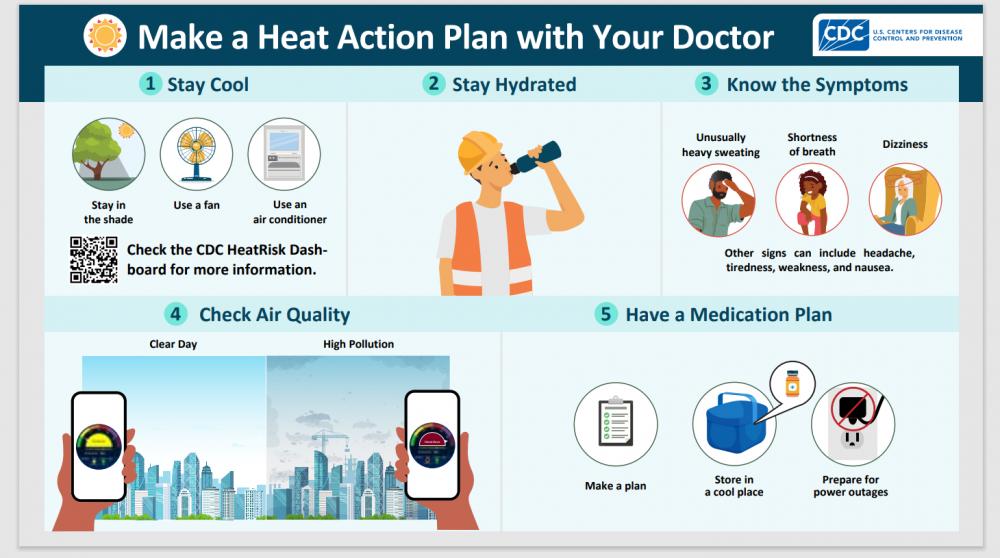
Summertime brings a change of mind and a change of attitude. But the change in weather also means you need to be up on summer health tips!
For instance, the recent heatwave’s searing temperatures remind us how dangerous extreme heat can be. More than 100 people ended up in emergency rooms across the city for heat-related illnesses, according to the City Health Department. In 2024, more than 700 people died from extreme heat in the US, according to the Centers for Disease and Prevention (CDC), although that number may be significantly higher if underlying health issues are factored in.
“Staying cool is a must in the heat, no matter how high the temperature is,” says Dr. Ashley Guadalupe-Padgett, Medical Director at Ryan Health | West 97th Street. “People don’t understand how quickly your body can overheat, which can cause you to get sick.” Dr. Guadalupe-Padgett warns, "Heat stroke and heat exhaustion are real! Please make sure to hydrate while you enjoy this summer".
There are simple rules to follow for dealing with the heat that can keep you safe. And there are also symptoms you should look out for if you’re overheating.
Stay Cool
- Remain in air conditioning as much as possible.
- Find a cooling center near you by using this link or by calling 3-1-1.
- Use fans, but only if the indoor temperature is less than 90 degrees. In temps above 90 degrees, a fan can increase body temperature.
- Schedule outdoor activities in the morning and evening hours.
- Pace yourself and cut down on exercise in the heat.
- Use one of NYC’s public pools. Find one near you using this link.
- Wear sunscreen.
- Don’t leave people or pets in parked cars.
- Avoid hot and heavy meals.
Stay Hydrated
- Drink plenty of water, even if you’re not thirsty, and stay away from sugary, caffeinated, or alcoholic drinks. **If your doctor has you on water pills, ask how much water you should drink.
- Replace salt and minerals you lose through sweat.
- Carry a water bottle with you and fill it throughout the day.
- Your urine will be light yellow or clear if you are drinking enough water.
Know the Symptoms of Overheating
Know the symptoms of overheating and know when to seek medical care. Symptoms include:
- Muscle cramping
- Unusually heavy sweating
- Shortness of breath
- Dizziness
- Headaches
- Weakness
- Nausea
Have a Plan for Your Medicine
“There are medicines that can make you dehydrated or overheated on hot days, so you need to be aware of those side effects,” says Dr. Guadalupe-Padgett. “Also, be sure you know how to store your medicines, as many need to be kept out of hot places.”
- Don’t stop or change medicines until you talk to your doctor.
- Make a plan for what to do with refrigerated medicines or electronic medical devices in case of a power outage.
Beware of the Sun!
Protecting your skin from sun damage is a year-round exercise, but it takes on more importance in the summer. Skin cancer is on the rise, according to the National Cancer Institute. What’s the best way to protect yourself from damaging ultraviolet (UV) radiation from the sun? The Food and Drug Administration (FDA) recommends:
- Limit your time in the sun, especially between 10am and 2pm when the sun’s rays are the strongest.
- Wear light clothing to cover sun-exposed skin — and don’t forget a hat!
- Use broad-spectrum sunscreens with an SPF value of 15 or higher. Use it even on cloudy days and reapply at least every two hours.
- Protect your eyes with a good pair of sunglasses. They should have a UV400 rating or “100% UV protection” on the label.
Prepare for Summer Seasonal Allergies
Pollen, smog, bugs, mold — those are the major causes of summer allergies. We’ve all experienced the symptoms: runny nose, watery eyes, sneezing, coughing, itchy eyes and nose, and dark circles under your eyes. So, what can you do? WebMD offers the following tips for surviving seasonal allergies:
- Stay inside when pollen count and smog levels are high.
- Run your air conditioner to keep allergens out, and use an air purifier.
- Clean the air filters in your home often. Also, clean the places pollen collects, like vents and bookshelves.
- Vacuum often and wear a mask, because the process can kick up pollen, mold, and dust trapped under your carpet.
- Wash bedding and rugs in hot water to get rid of dust mites and other allergens.
- Wash your hair, shower, and change your clothes after you go outside.
“Summer isn’t a time to let up on your good health habits,” says Dr. Guadalupe-Padgett. “Always be aware of changes in your body or the way you feel, and act accordingly — whether that’s for extreme heat or an allergy attack.”
